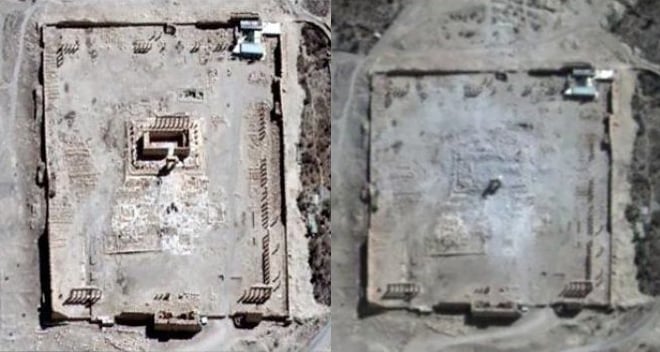
Satellite imagery of the Temple of Bel in Palmyra both before and after ISIS destroyed it.
Photo: UNOSAT.
Despite conflicting reports indicating that the Temple of Bel, said to be the most important structure in the ancient Syrian city of Palmyra, had survived a demolition attempt by ISIS, satellite imagery released by the UN confirms that the building has been destroyed.
Though the Islamic militant group took control of Palmyra in May, the World Heritage Site had remained largely unscathed until mid-August, when ISIS beheaded Khaled al-As’ad, the city’s 82-year-old archaeologist custodian, in the main square, and blew up the temple of Baal Shamin, which dates to 17 AD.
The Temple of Bel, Palmyra, Syria, in 2010.
Photo: Bernard Gagnon, via Wikimedia Commons.
ISIS’s next target was the Temple of Bel, which Maamoun Abdulkarim, head of the Syrian Department of Antiquities and Museums, called “the most important temple in Syria and one of the most important in the whole Middle East,” as reported by CNN.
The world received a dose of false hope over the temple’s fate yesterday when Abdulkarim told the BBC that “our information is provisional, but it indicates that any damage done was partial, and the basic structure is still standing.”
In the newly released images, the central shrine and its colonnaded courtyard have clearly been demolished, the only thing remaining intact being a small columned gateway within the temple complex.
The Temple of Bel, Palmyra, Syria, in 2005.
Photo: James Gordon, via Wikimedia Commons.
Palmyra has been nicknamed the “Pearl of the desert” for its well-preserved Greco-Roman ruins, and UNESCO describes it as “one of the most important cultural centers of the ancient world.”
The Temple of Bel, dedicated in 32 AD, was among the city’s best-preserved buildings. With over 1,000 columns and many ornate carvings, the temple blends ancient Near Eastern and Greco-Roman architectural styles.
“This is the most devastating act yet in my opinion,” former Syrian antiquities official Amr al-Azm told the AP. “It truly demonstrates ISIS’s ability to act with impunity and the impotence of the international community to stop them.”
Related Stories:
FBI Warns American Collectors Against Flood of New ISIS-Smuggled Antiquities
UNESCO Confirms ISIS Funding Terrorist Activities By Selling Looted Artifacts
ISIS Destroying Iraq’s Cultural Heritage One Site at a Time
Syria’s Cultural Artifacts Are Blood Diamonds for ISIS